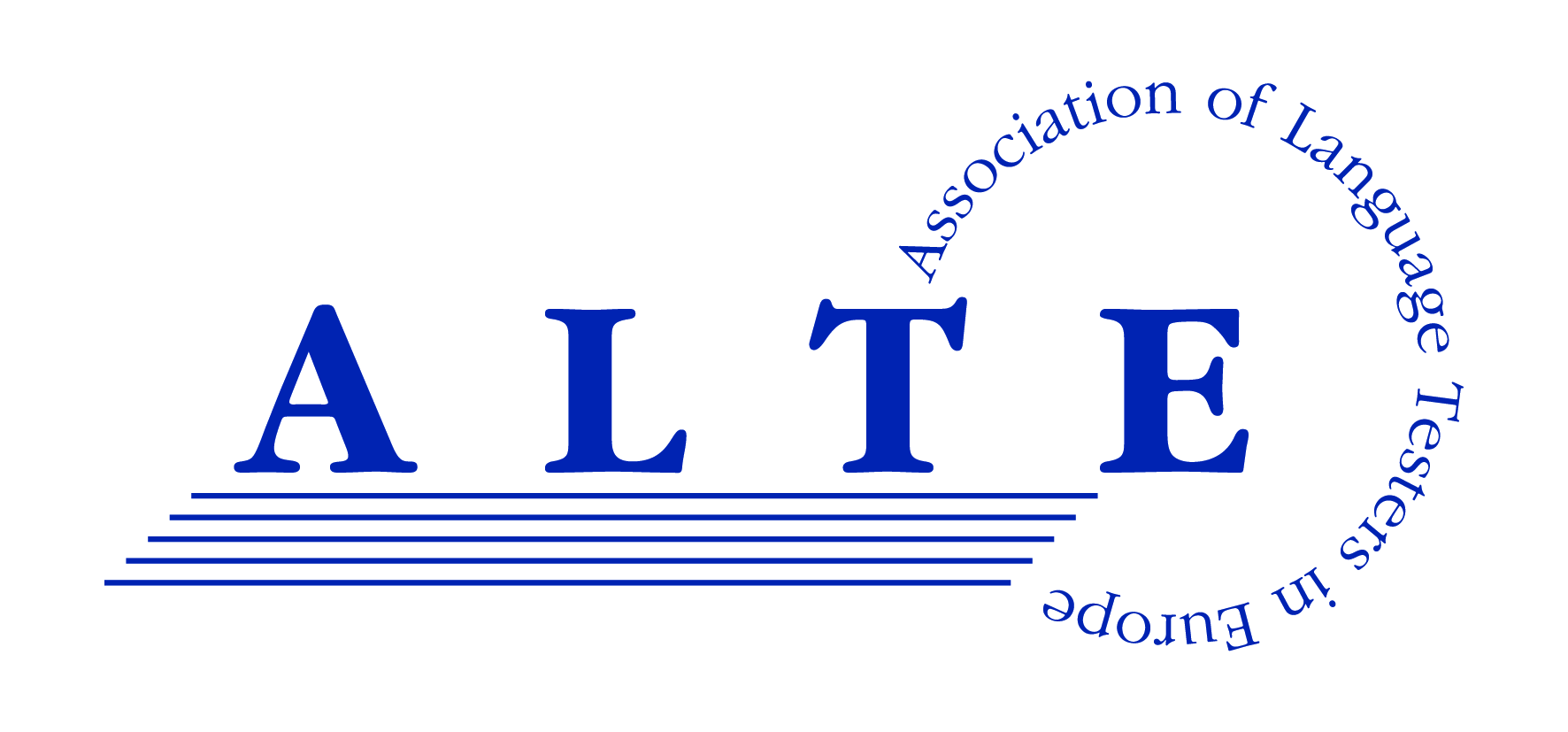On the Czech music scene, guitarist and composer Igor Ochepovsky has been described as the biggest discovery of recent years. His name is his trademark and the Ochepovsky Project band is evolving along with its bearer. The musical influences range from jazz to classical music to groove, but one thing remains - this is a dream band. One of the most successful graduates of a one-year course at the Institute for Language and Preparatory Studies talked to us about music and Czech.
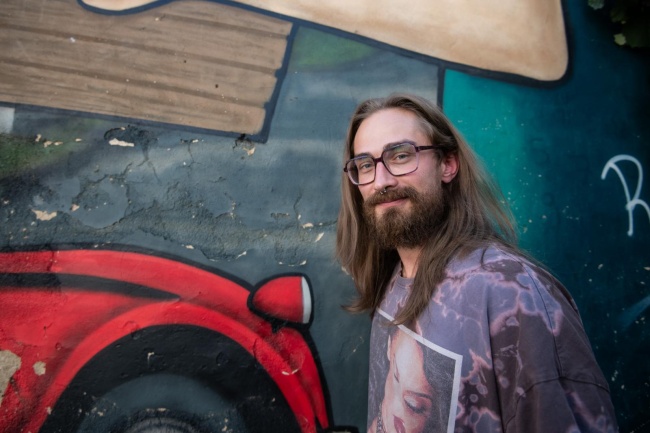
How would you define your music?
I enjoy wrestling with intensity and energy, drawing the listener in and somehow pulling them away from their thoughts, capturing their attention, taking them away from the everyday. The musical language I use is rather expressive, it's like a storm - full of emotion and dynamics. I'm just someone who likes intense things, so if I'm just composing for myself, I work with the fullness of the music, but when it's a project like the one for La Putyka, it's a different way of working. Everything has its role and in music, as in life, everyone is looking for something different. Music is an unfolding of energy. For example, now I am performing with Lenka Dusilová and we have more space together for variations in intensity and silence. I'm just the kind of person who enjoys the intensity of the music, but also appreciates the ambient mood in some of the compositions. Every musical element has its place in this orchestration.
Is there any room for silence in your turbulent life?
Life is hectic, but I enjoy the silence as much as the musical tones. When I need to relax or escape to the country, I reach for the best earplugs to fully immerse myself in the symphony of silence. My work is all about sounds and noises, so I have to be vigilant not to cross the fine line where my head makes it clear that it's time to slow down. It is exactly the same as when an athlete flexes his muscles during exercise and after a while realizes he needs to rest. The athlete feels muscle fatigue, I suddenly perceive the sound inside me in a completely different way and I know that my body is asking for comfort. When I allow myself silence, ideas and sounds that would otherwise remain hidden miraculously begin to pop up.
You have composed music for theatre, film and computer games. Are you currently working on a new project?
I don't consider myself a film or theatre composer. It's an enormous job to create music for the theatre, and sometimes you may find yourself just accompanying something. But if there were an art project where I could express myself musically, like Boom by Cirk La Putyka or EGO by Losers Cirque Company, I would appreciate it.
What exactly are you working on now?
One would like to do more things, but it is impossible to manage everything. We all have really full calendars, and when we want to get the band together for a rehearsal, it means looking for a date several months in advance. The release of a new single is coming up and I'm preparing a solo project, this time it will be electronic music, but it's still maturing and it will probably crystallize into my main project. I lead Lenka Dusilova's support band, I perform with Štěpán Hebík alias 7krát3, I work in the studio, I do music production for various artists, I record, I create sound design. My great advantage is that my technical knowledge allows me to create my own design in music software and directly implement what I want.
You graduated from a high school of mathematics, does your affection for mathematics translate into your compositions?
I enjoy mathematics and technical fields in general, which is also why I like music theory, which I lean on and try to apply. Especially in the first album, where there were large compositions, I worked with geometry and mathematics. I drew the forms of the songs. I often imagine the music visually geometrically. I visualize a linear progression, so the sketches are more like simple visual cues that inspire me to get a sense of where the tension and release is. (Ochepovsky picks up a pencil and draws on paper while explaining.) Music is a very abstract branch of art, so the sketch cannot be completely replayed, but it is possible to read from it where something starts, something develops, sometimes some rhythmic elements, where it changes and expands, for example by instrumentations, where it stops, breaks and finally finishes without any big tensions.
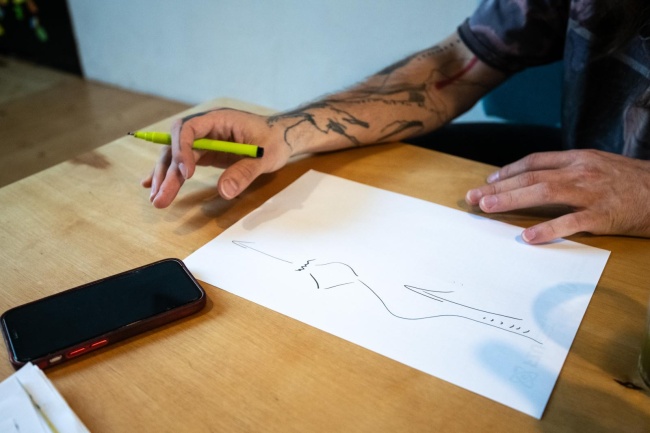
When you moved to the Czech Republic, you learned Czech at the Institute for Language and Preparatory Studies in Albertov. What are your memories of your student years?
I really enjoyed it. It was one of the best years of my life. It was kind of an interlude between going to the conservatory and living in Russia, where I had left everything. I arrived in a new country, I was getting to know a new culture and language and I had basically nothing else to do at the time, so it was a completely carefree period. We lived on the first floor of the Krystal hotel and would go together to Czech lessons at Albertov. We had a great teacher, unfortunately I don't remember her name, but she was a blonde who always laughed and smoked cigarettes. Looking back, I'm sorry I lost touch. I was in Krystal recently, because I have a physiotherapist there. I saw the UJOP students, and I remembered those good times, and I thought to myself: What lies ahead for you guys here?
You are fluent in Czech, but prefer English in your texts…
Czech has the disadvantage of having short and long vowels, which requires a superhuman achievement from the songwriter to make Czech sound musical. In many languages, you can stretch any part of the word to fit the melody and make it singable, but you can't do that in Czech. That's why the melodies in Czech are more choppy and less melodic, kind of swinging. Modern Czech is simply uncompromising.
After the Russian invasion of Ukraine on February 24, 2022, you recorded the anti-war song I Won't Give Up, which is an arrangement of two songs by the iconic Ukrainian rock band Okean Elzy.
The #nevzdamse (I Won't Give Up) project was supposed to draw attention to the situation of ordinary Russians and Belarusians who are threatened with sanctions for expressing support for Ukraine. I speak to people through music, so I chose the iconic songs Obijmi (Обійми - Hug) and Bez boji (Bezboю - Without a Fight), which are well known to Ukrainians, Russians and Belarusians. Our nations and cultures are united by melodies, as well as themes of love, hope, courage and determination. Moreover, I managed to involve the best artists I know in the recording process - David Koller, Monika Načeva, Lenka Dusilová, guitarists Michal Pavlíček and Nikita Krein, singer Igor Orozovič, accordionists Aliaksandr Yasinski and Roman Zabelov, balalaika player Kirill Yakovlev, double bassist Taras Volos, violinists Vartui Saribekian and Natalii Lisniak, cellist Simon Marek, violist Jan Forest, domra player Kateryna Vatchenko and my sister and pianist Olesya Ochepovska.
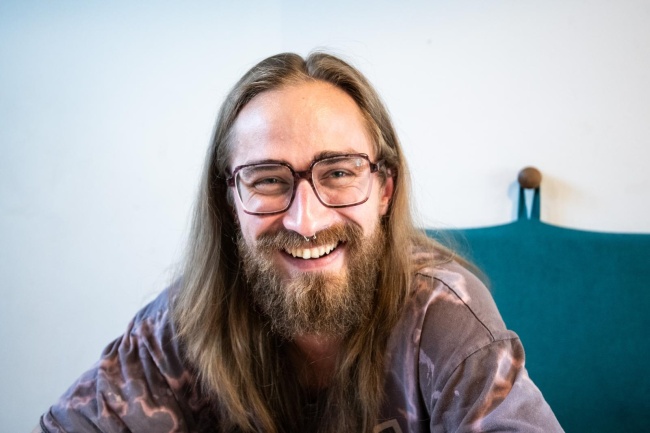
You keep introducing foreign influences to your music, are you thinking about moving?
This country is pretty much my home now. It is a great place to live, but unfortunately the music market in Czechia is very small and specific. If there is an opportunity to work internationally, it will be great. I have a four-month-old baby, it's my first child, so a whole new world has opened up for me, a different level of love, and that manifests itself tremendously in all aspects of my life and in my music. Frida is discovering sounds, different voice positions, we are not talking yet, but we are making different sounds. Suddenly I started to feel the music more intensely in a different way.
Text: Petra Köppl
Photo: René Volfík
All you need to do is – learn Czech and prepare for the entrance exam.
We can help you with both in our preparation programmes at ÚJOP, Charles University.
Apply in time!
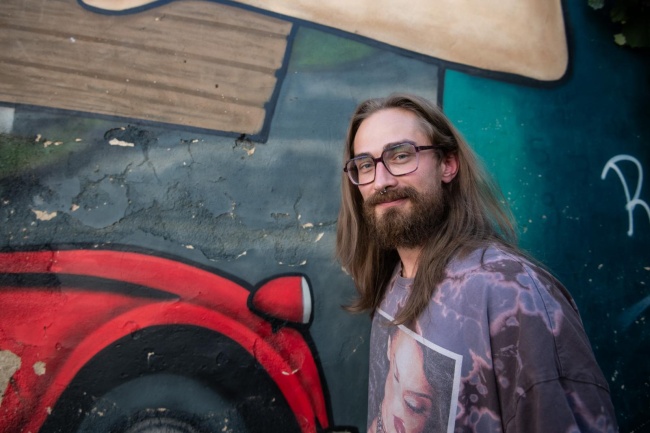
Composer, guitarist and producer whose music combines elements of jazz, neo-soul, hip hop and pop. He has written music for the theatre show Losers Cirque Company by La Putyka, films (En tierra de machos, el joto es rey, El silencio de la sirena, A Day of Mourning) and computer games (Blast Brigade vs. the Evil Legion of Dr. Cread). He collaborates with leading personalities of the Czech music scene such as Ewa Farna, David Koller, Lenka Dusilova or 7krát3. His band Ochepovsky Project, founded in 2016, emerged as a new discovery on the Czech jazz and alternative scene. In March 2022, he and his wife initiated the #nevzdamse project, in which the musicians expressed their protest against the war in Ukraine.
General Contact
ujop@ujop.cuni.cz
+420 224 990 411
Support Contact - Courses:
studujop@ujop.cuni.cz
+420 224 990 420![]() +420 778 754 481
Support Contact - Exams for Permanent Residency:
praha.trvalypobyt@ujop.cuni.cz
+420 224 090 210
Support Contact - Exams for Citizenship:
obcanstvi@ujop.cuni.cz
+420 224 990 451
Support Contact - CCE Exams, Exams for Faculty of Medicine, MOCK TESTS:
vtc@ujop.cuni.cz
+420 224 990 451
+420 778 754 481
Support Contact - Exams for Permanent Residency:
praha.trvalypobyt@ujop.cuni.cz
+420 224 090 210
Support Contact - Exams for Citizenship:
obcanstvi@ujop.cuni.cz
+420 224 990 451
Support Contact - CCE Exams, Exams for Faculty of Medicine, MOCK TESTS:
vtc@ujop.cuni.cz
+420 224 990 451
ID No.: 00216208, VAT No.: CZ00216208
Data Box ID: piyj9b4
Connect with us
The Institute for Language and Preparatory Studies of Charles University (ILPS CU)
Vratislavova 29/10
128 00 Prague 2
Czech Republic
